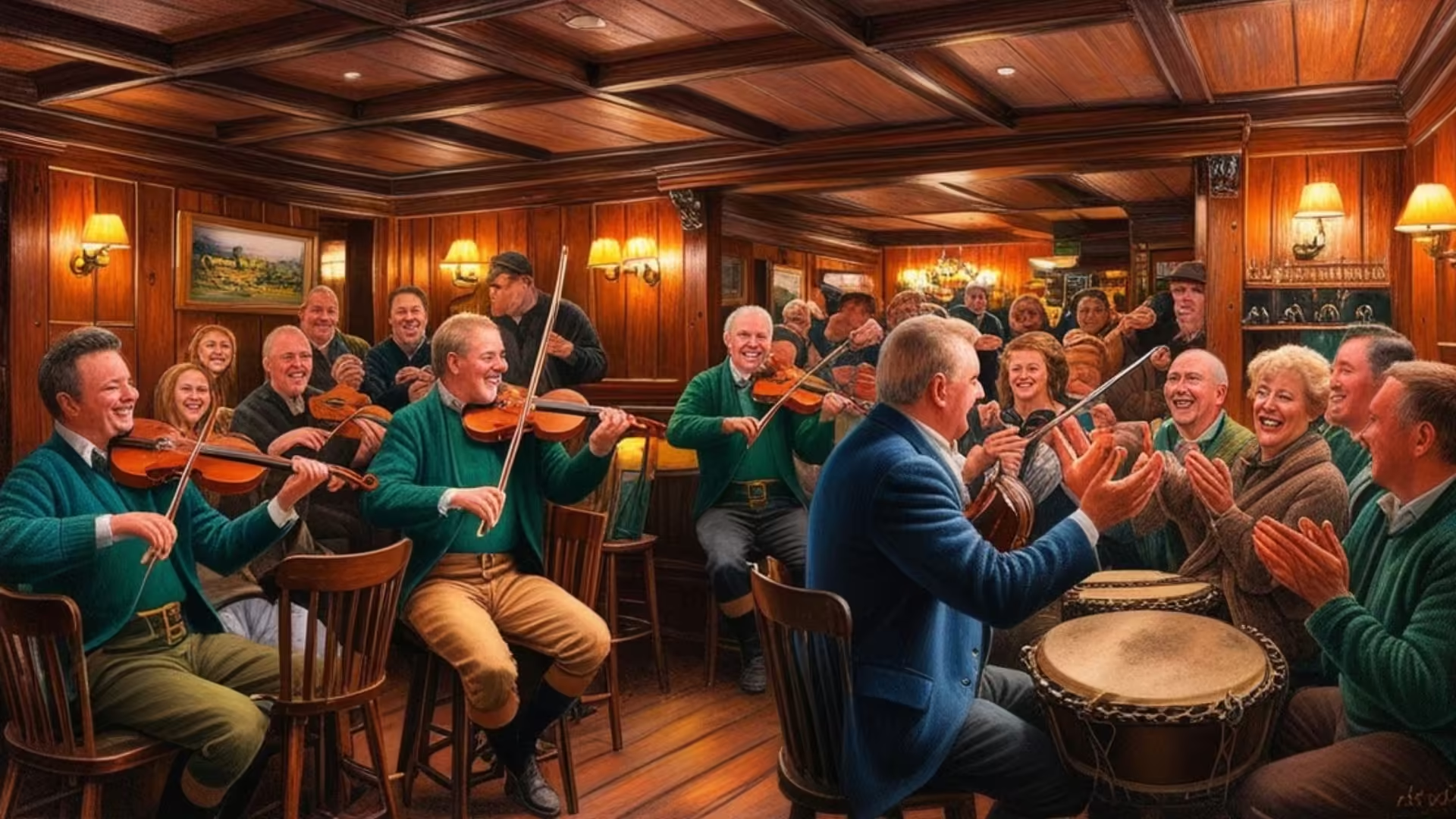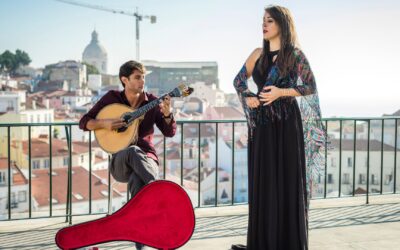- The Gist
- Introduction to Irish Music Sessions
- The Origins and Evolution of Irish Music Sessions
- The Elements of an Irish Music Session
- Why Irish Music Sessions Hold Cultural Significance
- The Global Influence of Irish Music Sessions
- How to Experience an Irish Music Session
- Celebrating the Heartbeat of Irish Culture
- Let’s Talk
- Let’s Learn Vocabulary in Context
The Gist
Introduction to Irish Music Sessions
Imagine walking into a cozy Irish pub, where the sound of fiddles, tin whistles, and bodhráns fills the air. Musicians sit in a circle, exchanging nods and smiles as they launch into a tune. Patrons sway to the rhythm, clapping along, while the room vibrates with warmth and a sense of shared heritage. This is the heart of an Irish music session—a spontaneous, collaborative celebration of Ireland’s rich musical culture.
Irish music sessions, known locally as “seisiúns,” are unique gatherings where musicians play traditional Irish music in a relaxed, social setting. These sessions are not formal performances but rather communal experiences where anyone familiar with the music can join in. Held in pubs, community halls, and private homes across Ireland and beyond, seisiúns bring together people of all ages, backgrounds, and skill levels. They serve as a bridge between past and present, carrying forward the traditional tunes and spirit that define Irish culture.
The Origins and Evolution of Irish Music Sessions
The roots of Irish music sessions can be traced back to the Irish folk music tradition, which stretches back centuries. In rural Ireland, music was an essential part of life. Families and neighbors gathered at homes or community gatherings to sing, play instruments, and share stories. This music, often passed down orally, reflected Ireland’s history, including its struggles, triumphs, and deep connection to the land.
In the mid-20th century, Irish music sessions began to take on a more formalized structure, largely within pubs, where musicians could come together, share tunes, and keep these traditions alive. This move to public spaces allowed Irish music to reach new audiences and gain international recognition. While the essence of the sessions remained informal and inclusive, the pub setting provided a stable home for the tradition to grow and thrive.
The Elements of an Irish Music Session
At a typical Irish music session, musicians sit in a loose circle, playing traditional tunes on instruments like the fiddle, tin whistle, bodhrán (a traditional Irish drum), flute, and accordion. There’s no sheet music; instead, musicians rely on memory, intuition, and deep familiarity with the tunes. These sessions are characterized by spontaneity—any musician can start a tune, and others join in if they know it. It’s a beautiful display of cooperation, where no single player is the star, and everyone contributes to the collective experience.
Irish music sessions often include several types of tunes, such as jigs, reels, and hornpipes. Each tune has its own rhythm and mood, from the energetic foot-tapping reels to the hauntingly slow airs. Musicians often blend one tune into another, creating a seamless flow of music that can last for hours. Occasionally, a singer might share a traditional ballad, telling a story of love, loss, or bravery that resonates with the listeners.
One of the most fascinating aspects of Irish sessions is the unwritten etiquette that governs them. Musicians respect each other’s space, taking turns to start tunes and allowing newcomers to join in. It’s a collaborative environment, welcoming to those who understand the music’s nuances, but it also requires a certain level of respect and understanding from participants.
Why Irish Music Sessions Hold Cultural Significance
Irish music sessions are more than entertainment—they’re a way for communities to connect, celebrate, and preserve their cultural heritage. Through these gatherings, Irish people honor their ancestors, traditions, and values. The music embodies the resilience, warmth, and joy that define Ireland, making sessions a powerful expression of national identity.
For many Irish people, music sessions are a form of storytelling. Each tune tells a story of Irish history, whether it’s a joyful celebration or a soulful reflection of past hardships. The lyrics of traditional ballads often capture tales of emigration, rebellion, and unrequited love, creating a strong emotional bond between the musicians and the audience. This storytelling aspect gives the music a deeper significance, as it conveys shared experiences and memories that unite generations.
Furthermore, Irish music sessions have become a symbol of hospitality and inclusivity. These gatherings welcome anyone who appreciates the music, regardless of nationality, age, or background. Visitors to Ireland often find themselves swept up in the energy of a session, discovering a sense of belonging and connection to Irish culture. In this way, sessions are not just for the Irish—they’re a gift that Ireland shares with the world.
The Global Influence of Irish Music Sessions
As the Irish diaspora spread across the world, so did the tradition of Irish music sessions. Today, you can find sessions in cities like New York, Sydney, and Buenos Aires, where musicians and fans gather to celebrate Irish music. These sessions allow people of Irish descent to connect with their roots and give others the chance to experience Irish culture firsthand.
In many ways, the global spread of Irish sessions has strengthened the tradition. Musicians in the United States, Canada, and other countries bring their own interpretations to the music, enriching it while remaining true to its essence. These global sessions foster cross-cultural exchanges, as musicians from different backgrounds share techniques and experiences, blending Irish music with other musical styles.
How to Experience an Irish Music Session
If you’re lucky enough to visit Ireland, attending a live music session is a must. Many pubs in cities like Dublin, Galway, and Cork host regular sessions, where you can witness the magic firsthand. Even if you’re not a musician, you’ll feel the communal spirit that fills the room as people come together to share in the joy of music.
If you’re outside of Ireland, look for Irish pubs or cultural centers that host sessions. Some communities have regular gatherings open to both musicians and listeners. These sessions provide a taste of Ireland’s musical heritage and offer a chance to meet others who share a love for the music. You might even be inspired to pick up an instrument and learn a few tunes yourself!
Celebrating the Heartbeat of Irish Culture
Irish music sessions are a living tradition, bringing people together to celebrate the rhythms, stories, and emotions that make Irish music so unique. They are a reminder that music is not just something we listen to—it’s something we feel and share with others. Through sessions, Ireland keeps its cultural heritage alive, passing down melodies and memories that continue to resonate across generations and borders.
For anyone with a love for music, an Irish music session is an experience unlike any other. It’s a chance to connect with history, enjoy the present, and be part of a community that values tradition, creativity, and connection. As long as these sessions continue, the spirit of Ireland will thrive, echoing in every note and every heartfelt tune.
Let’s Talk
Isn’t there something magical about the idea of an Irish music session? Imagine sitting in a cozy corner of a pub, watching musicians come together as if by instinct, playing without sheet music, completely in sync. There’s no conductor, no setlist, just a shared rhythm and unspoken understanding. It makes you wonder—how often do we get moments like that, where everything flows naturally, where everyone just knows their role without needing direction?
Irish music sessions are more than just musical gatherings; they’re a perfect mix of tradition, community, and a little bit of chaos. The spontaneity of it all is part of the charm. Think about it: if you show up with an instrument and know the tunes, you’re in. There’s no audition, no one asking for your credentials—just jump in and go. I wonder how much better we’d all feel if we had more spaces like that in our everyday lives, where you could just join in without needing to prove yourself. It’s like an open invitation to be part of something bigger.
And then there’s the whole storytelling aspect. Each tune has a story behind it, and every musician brings their own history and emotions to the session. It’s almost as if the music holds memories, not just melodies. Even if you’re a visitor, you can feel the layers of history in each note, the tales of love, loss, resilience, and joy. What’s fascinating is that, in a way, everyone present becomes part of the story. Have you ever had a moment like that, where you felt completely part of something, even as an outsider?
But here’s another thought: Irish music sessions don’t need fancy equipment or a formal setting—they happen in pubs, on the street, in people’s homes. It’s a reminder that community and culture don’t need grand stages; they thrive in everyday spaces. The beauty of it is that it’s accessible to everyone. I think we sometimes get caught up in the idea that culture only happens in museums or theaters, but Irish sessions show us that culture is alive, breathing, and it’s right there if we’re open to it.
So, what do you think—would you join a session if you could? Or maybe just sit back and soak it all in? There’s something about these gatherings that invites you to be a part of it, even if you’re just clapping along. And maybe it makes us think: where else in life can we bring that sense of openness, that willingness to share and connect, and create our own little “sessions” of community and togetherness? It’s a fun idea to play with, isn’t it?
Let’s Learn Vocabulary in Context
Let’s dig into some of the vocabulary from our talk about Irish music sessions, each word carrying a bit of the culture and tradition with it. These are words you’ll find useful beyond music, too, as they have layers of meaning that pop up in daily life.
First, let’s start with session. In the context of Irish music, a session is a gathering where musicians play traditional tunes together. But we also use session to describe a dedicated time to do something, like a study session or a workout session. You might say, “Let’s have a brainstorming session to come up with new ideas.”
Then there’s tradition. Traditions are customs or beliefs passed down through generations, like family traditions during the holidays or cultural traditions like Irish music sessions. Tradition is all about continuity. For example, “One family tradition we have is to make pancakes every Sunday.”
Gathering is another good one. A gathering is any get-together of people, whether it’s a big family reunion or a small group of friends. Gatherings are all about bringing people together to connect, talk, and share. You could say, “We had a small gathering for her birthday.”
Spontaneity refers to the ability to do things without a plan—just going with the flow. Irish sessions are spontaneous because musicians decide tunes on the spot. Spontaneity can also apply to everyday moments, like a spontaneous road trip or trying a new restaurant without planning ahead. For instance, “I love a bit of spontaneity; it keeps life exciting.”
Community is at the heart of Irish sessions, where everyone comes together with a shared love for the music. Community is any group of people with something in common, like a neighborhood or a group of coworkers. You might say, “Volunteering helped me feel connected to my community.”
Next up is heritage. Heritage is the history, culture, and traditions we inherit from those who came before us. For the Irish, music is a huge part of their heritage. We use heritage to talk about our roots, like “I’m exploring my cultural heritage through cooking traditional dishes.”
Storytelling is a big part of Irish sessions, where every tune tells a story. Storytelling is the art of sharing experiences or narratives, whether through music, writing, or simply talking. In everyday life, you might say, “Grandma has a gift for storytelling—her tales are the best part of family dinners.”
Connection is all about feeling close to something or someone. In Irish sessions, there’s a strong connection between musicians, listeners, and tradition. We all seek connection, whether with people, interests, or ideas. You could say, “Reading a good book helps me feel a connection to different perspectives.”
Inclusivity is the idea of welcoming everyone, no matter who they are. Irish music sessions are known for their inclusivity, where anyone can join if they know the tunes. Inclusivity is also important in workplaces, communities, and friendships. For example, “Inclusivity is key to making everyone feel valued and accepted.”
Finally, there’s identity. In a way, Irish music sessions are part of the Irish identity—something that defines them. Identity is how we see ourselves and the qualities or culture that shape us. You might hear, “Traveling helped me understand my identity better by exposing me to new ways of life.”
Here are a couple of questions to think about: What’s a tradition or gathering that has special meaning in your life? And how do you feel when you experience or connect with parts of your cultural heritage?










0 Comments